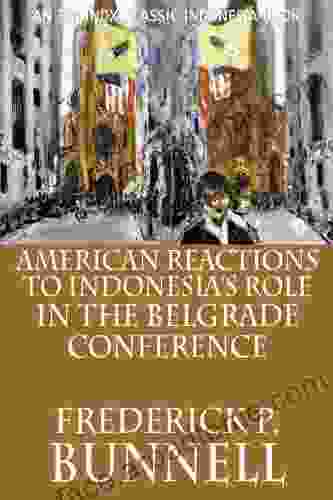Unveiling the American Reactions to Indonesia's Role in the Belgrade Conference

4.5 out of 5
| Language | : | English |
| File size | : | 346 KB |
| Text-to-Speech | : | Enabled |
| Enhanced typesetting | : | Enabled |
| Word Wise | : | Enabled |
| Print length | : | 102 pages |
| Lending | : | Enabled |
A Diplomatic Dance: Indonesia's Balancing Act
In the midst of the Cold War's icy grip, the Belgrade Conference of 1961 emerged as a pivotal moment in international relations. Against this backdrop, Indonesia, led by its charismatic president Sukarno, played a pivotal role as a non-aligned nation, navigating the treacherous waters between East and West.
Sukarno's astute diplomacy and Indonesia's strategic position as a newly independent nation granted them a unique opportunity to influence the course of events. Indonesia's unwavering commitment to non-alignment and its active involvement in the Non-Aligned Movement (NAM) allowed it to bridge divides and foster dialogue between the opposing blocs.
American Ambivalence and Wariness
America's reaction to Indonesia's role in the Belgrade Conference was a complex tapestry of ambivalence and wariness. On one hand, the United States acknowledged Indonesia's efforts to promote peace and dialogue. However, concerns lingered about Indonesia's close ties with the Soviet Union and its vocal criticism of Western policies.
American policymakers grappled with the delicate balance of maintaining relations with Indonesia while countering its perceived pro-Soviet leanings. This diplomatic tightrope walk demanded a nuanced approach, as the United States sought to maintain its influence in Southeast Asia while respecting Indonesia's independence.
Diplomatic Maneuvers and Shifting Alliances
The Belgrade Conference became a stage for diplomatic maneuvers and shifting alliances. Indonesia's mediation efforts, alongside other non-aligned nations, played a crucial role in easing tensions between the Soviet Union and the United States. Sukarno's personal charisma and his ability to bridge divides earned him respect and admiration on the world stage.
However, Indonesia's close relationship with the Soviet Union raised eyebrows in Washington. The United States feared that Indonesia's non-aligned stance could be a smokescreen for pro-Soviet sympathies. This perception further complicated the already delicate diplomatic dance between the two nations.
A Legacy of Influence and Inspiration
Indonesia's participation in the Belgrade Conference left a lasting legacy on American foreign policy. It forced the United States to reassess its approach to non-aligned nations and acknowledge the growing influence of the NAM. Indonesia's role as a mediator and bridge-builder demonstrated the potential for non-aligned nations to play a constructive role in the Cold War's intricate geopolitical landscape.
Sukarno's charismatic leadership and Indonesia's principled stance on non-alignment continue to inspire nations striving for independence and diplomatic autonomy. The Belgrade Conference stands as a testament to the power of diplomacy, the importance of non-alignment, and the enduring impact of Indonesia's global contributions.
: Unraveling a Diplomatic Tapestry
The American reactions to Indonesia's role in the Belgrade Conference reveal the complexities of Cold War diplomacy and the challenges of navigating the global stage. Indonesia's unique position as a non-aligned nation allowed it to influence world events and shape the course of history.
This in-depth exploration of American reactions to Indonesia's involvement in the Belgrade Conference serves as a valuable lesson in international relations and the enduring power of diplomacy. It invites us to reflect on the shifting dynamics of the Cold War, the role of non-aligned nations, and the legacy of Indonesia's diplomatic endeavors.
4.5 out of 5
| Language | : | English |
| File size | : | 346 KB |
| Text-to-Speech | : | Enabled |
| Enhanced typesetting | : | Enabled |
| Word Wise | : | Enabled |
| Print length | : | 102 pages |
| Lending | : | Enabled |
Do you want to contribute by writing guest posts on this blog?
Please contact us and send us a resume of previous articles that you have written.
 Book
Book Novel
Novel Page
Page Chapter
Chapter Text
Text Story
Story Genre
Genre Reader
Reader Library
Library Paperback
Paperback E-book
E-book Magazine
Magazine Newspaper
Newspaper Paragraph
Paragraph Sentence
Sentence Bookmark
Bookmark Shelf
Shelf Glossary
Glossary Bibliography
Bibliography Foreword
Foreword Preface
Preface Synopsis
Synopsis Annotation
Annotation Footnote
Footnote Manuscript
Manuscript Scroll
Scroll Codex
Codex Tome
Tome Bestseller
Bestseller Classics
Classics Library card
Library card Narrative
Narrative Biography
Biography Autobiography
Autobiography Memoir
Memoir Reference
Reference Encyclopedia
Encyclopedia Douglas B Smith
Douglas B Smith Pearl Barrett
Pearl Barrett Dietmar Offenhuber
Dietmar Offenhuber Felicia Bender
Felicia Bender Henry Chadwick
Henry Chadwick Djedo Harte
Djedo Harte Dominique Prinet
Dominique Prinet John Colapinto
John Colapinto Jan Johnsson
Jan Johnsson Robert Hume
Robert Hume Neil A Clark
Neil A Clark Douglas Allen
Douglas Allen Diomira Rose D Agostino
Diomira Rose D Agostino Jason Goldtrap
Jason Goldtrap Dr Adrienne T Hunter
Dr Adrienne T Hunter Thomas A Parham
Thomas A Parham Diana Deutsch
Diana Deutsch Robert Walker
Robert Walker Eng Abdul Qadeer
Eng Abdul Qadeer Tej K Bhatia
Tej K Bhatia
Light bulbAdvertise smarter! Our strategic ad space ensures maximum exposure. Reserve your spot today!

 Dustin RichardsonUnlocking the Enigmatic Symbolism of the Crescent: A Journey with Thupten...
Dustin RichardsonUnlocking the Enigmatic Symbolism of the Crescent: A Journey with Thupten...
 Allen GinsbergChakra Shadow Work Journal: Know Thyself, Heal Thyself - A Profound Journey...
Allen GinsbergChakra Shadow Work Journal: Know Thyself, Heal Thyself - A Profound Journey... Ezekiel CoxFollow ·14.8k
Ezekiel CoxFollow ·14.8k Cody RussellFollow ·14.1k
Cody RussellFollow ·14.1k Jaime MitchellFollow ·13.5k
Jaime MitchellFollow ·13.5k Jimmy ButlerFollow ·12.7k
Jimmy ButlerFollow ·12.7k Marc FosterFollow ·6.5k
Marc FosterFollow ·6.5k Stuart BlairFollow ·3.3k
Stuart BlairFollow ·3.3k Stan WardFollow ·8.4k
Stan WardFollow ·8.4k Howard PowellFollow ·14.2k
Howard PowellFollow ·14.2k

 Brandon Cox
Brandon CoxUnveiling the Secrets of Core Concepts: The Ultimate...
Are you ready to unlock the doors...

 Colt Simmons
Colt SimmonsUnlock Your True Potential: Uncover the Real Reasons For...
Embark on a...

 Ivan Turner
Ivan TurnerLove You Mom But You And Dad Are Getting a Divorce
A Heartfelt and...

 Ervin Bell
Ervin BellIntroducing Mouse Paul Moorcraft: A Captivating Tale of...
Embark on an Unforgettable Journey...

 Mike Hayes
Mike HayesBattling Obesity In Teens And Shaping The Future
The Growing...

 Yasushi Inoue
Yasushi InoueEmbark on a Culinary and Cultural Voyage: Delve into the...
A Tapestry of...
4.5 out of 5
| Language | : | English |
| File size | : | 346 KB |
| Text-to-Speech | : | Enabled |
| Enhanced typesetting | : | Enabled |
| Word Wise | : | Enabled |
| Print length | : | 102 pages |
| Lending | : | Enabled |








